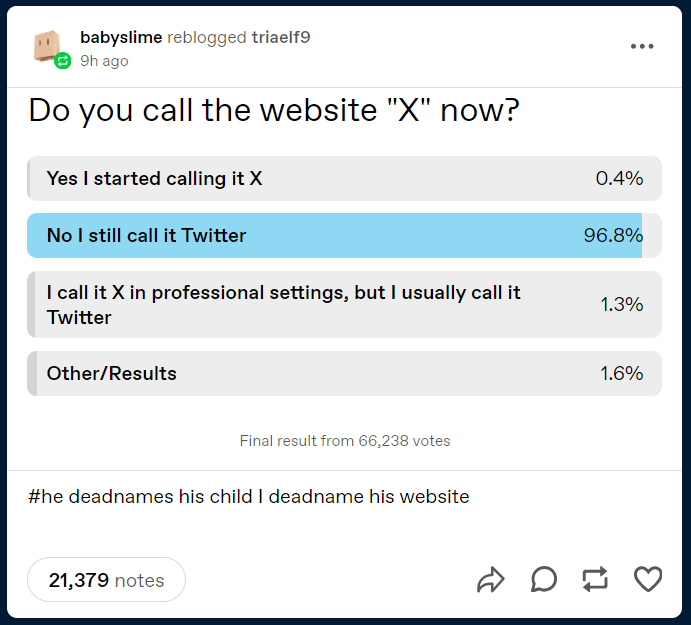this post was submitted on 29 Jan 2024
928 points (98.0% liked)
tumblr
3350 readers
1 users here now
Welcome to /c/tumblr, a place for all your tumblr screenshots and news.
Our Rules:
-
Keep it civil. We're all people here. Be respectful to one another.
-
No sexism, racism, homophobia, transphobia or any other flavor of bigotry. I should not need to explain this one.
-
Must be tumblr related. This one is kind of a given.
-
Try not to repost anything posted within the past month. Beyond that, go for it. Not everyone is on every site all the time.
-
No unnecessary negativity. Just because you don't like a thing doesn't mean that you need to spend the entire comment section complaining about said thing. Just downvote and move on.
Sister Communities:
-
/c/[email protected] - Star Trek chat, memes and shitposts
-
/c/[email protected] - General memes
founded 1 year ago
MODERATORS
you are viewing a single comment's thread
view the rest of the comments
view the rest of the comments

Thank you for your perspective. I had not considered that some would think of Twitter as something special and valuable. While Twitter has created some neat ideas, I see them as the "also ran that win due to huge amounts of cash". No morals involved.
The community that grew around Twitter was special, but temporary. Just like to communities before and after it.
Cheers
I appreciate that, but I don't even mean the community or the platform (I'm not sure that form of social media is a good thing for humanity, at least I don't think Twitter was) I mean the technologies developed (and shared widely) by Twitter
A big one is sharding. They needed to spread horizontally - no matter how powerful, a single database is a bottleneck at that scale. They needed to put databases in many datacenters too to serve a worldwide user base
But, since Twitter wanted to have one unified platform for everyone (as opposed to several country , and required (near) real time communication. But most of all, it had to be fast
So they invented (or maybe advanced, it's been a while since I read the write up) sharding. It's a way to keep multiple databases in sync. If someone in the UK responds to a tweet in the US, a user in the UK is going to update the UK/EU database. But now you have to sync them - and someone else in the US might've commented in the meantime.
You can sync it through code design, like activity-pub does for the fediverse - you could make each tweet or action a separate record, and push updates to every server. But then you're constrained in your design - everything must be built in a compatible way, and more complex records would take more custom code.
It could probably work for something like Twitter, but they made something more general. They came up with a way to do it at the database level - through some clever designs, they make it so multiple out of sync databases can be treated as a single database.
Now, you can just set up sharding, and don't need to worry about it anymore - now if you build a site and need to scale up quickly, it's basically a drop in solution. You barely have to change your code, if at all... The databases handle everything behind the scenes
They also made bootstrap, the first (or first widely used) style framework. You didn't have to style every button or block of text manually anymore, plus it came with some widely used components (like modals that pop up and gray out the screen, or those drop downs that let you pick a date). It made building modern websites so much easier, especially for people like me that had to be taught color theory to understand how to match my clothes.
Unfortunately, it seems like it was killed thanks to an elongated muskrat or something. But it led to many such frameworks and improved the web as a whole greatly
They did a bunch of public good work like that, kind of like Facebook their core business might be harmful, but they did a lot to advance software engineering as a whole
Thank you. I learned a lot from your post.
I am hopeful that the churning created by the upheaval will result in a number of new, innovative companies.